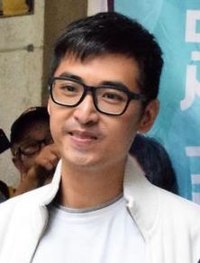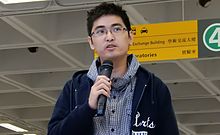Alex Chow
Alex Chow | |
|---|---|
 Chow on grant of bail, 7 October 2017 | |
| Born | Alex Chow Yong-kang 18 August 1990 |
| Education | University of Hong Kong (BA) London School of Economics (MA) University of California, Berkeley |
| Occupation | Social activist |
| Alex Chow Yong Kang | |||||||||||||
|---|---|---|---|---|---|---|---|---|---|---|---|---|---|
| Chinese | 周永康 | ||||||||||||
| |||||||||||||

Alex Chow Yong-kang (Chinese: 周永康; Sidney Lau: Jau1 Wing5 Hong1; born 18 August 1990) is a social activist from Hong Kong and current doctoral candidate in geography at the University of California, Berkeley.[1][2] He is a former secretary-general of the Hong Kong Federation of Students[3][4] and a former Vice-President (External) of the Hong Kong University Students' Union.[5]
Occupy Central

Chow was one of the main organisers of the Occupy Central campaign.[6][7] On 1 July 2014, following an annual pro-democracy rally, he organised a sit-in on Chater Road in central Hong Kong which was forcibly dispersed by police.[8][9] 511 people were arrested. He was quoted as saying at the time that "It’s not enough to repeat the march and the assembly every year. We have to upgrade it to a civil disobedience movement." He later wrote that "In the past 30 years, the democracy movement has been too slow and too painstaking. The power of civil disobedience lies … in the blood and tears of everyone who is behind the struggle."[6]
Umbrella Movement

In the early stages of the Umbrella Movement, he was an influential organiser and speaker. He was reported as announcing to protesters, "This is not a student movement; this is a Hong Kongers' movement"; he told The New York Times that "residents may occupy various government departments".[3][6] On 5 October, when the Federation of Students agreed to enter into dialogue with the government, Chow announced that the talks would be called off if attempts were made to forcefully remove protesters. In a speech at the main protest camp, he explained, "A dialogue is not a compromise. We will start arranging talks with the government, because we understand that there are people in both the government and here who want to solve society’s problems. We will not back down."[10]
Having attempted and failed to organise meetings with officials through local channels,[11][12] Chow and two other students were prevented from travelling to China to petition mainland government officials when they attempted to leave on 15 November.[13] The group, consisting of Chow, Nathan Law and Eason Chung, learned from airline officials that mainland authorities had revoked their Home Return Permits, effectively banning them from boarding the flight for Beijing.[14]
Chow and two other prominent Hong Kong pro-democracy student leaders, Nathan Law and Joshua Wong, were convicted on 21 July 2016 of unlawful assembly (incitement in Chow's case) at the Civic Square, Central Government Complex at Tamar, during a protest that triggered the 79-day Occupy sit-ins of 2014.[15] He was initially sentenced to three weeks of imprisonment over a suspended sentence on 15 August. A year later, his term was increased to seven months following an appeal to the High Court by the government.[16] The appeal by the government drew condemnation from overseas politicians and rights campaigners, who called the three "political prisoners".[17] Chris Patten, former governor of Hong Kong, said their names would be remembered "long after nobody can remember who I was, and perhaps nobody can remember who President Xi Jinping was".[17] The conviction, if not overturned on appeal, would result in Chow's disqualification from standing for election to the Legislative Council until July 2021.[18]
In February 2018, Chow, Law and Wong won an appeal at the Court of Final Appeal to overturn their jail sentences, after a five-judge panel said those sentences applied a new standard "retroactively".[19] The trio was previously given lighter sentences, with Wong and Law completing community service and Chow receiving a suspended prison term.[19] Human rights researcher Maya Wang said the Hong Kong government used this case to see how far it could go in pursuing political prosecutions and "redoubled efforts to weaken pro-democracy voices", adding that "no one should be prosecuted for a peaceful protest".[19]
At the time of Chow's imprisonment, the London School of Economics, at which Chow had been studying, reached out to both the UK and the Hong Kong government to seek reassurances over Chow's well-being after a petition gathered close to 5,000 signatures.[17] Chow was about to go to the University of California, Berkeley to start a doctoral program when he was unexpectedly imprisoned in August 2016.[20] Chow began a master's degree at the London School of Economics in 2016, followed by a doctorate at the University of California, Berkeley.[21][22]
References
- ^ Incoming UC Berkeley doctoral candidate jailed after leading pro-democracy protests in Hong Kong The Daily Californian. Retrieved 13 May 2020.
- ^ "Bearly Political Ep #1: Alex Chow and the Hong Kong Protests" Berkeley Political Review. Retrieved 13 May 2020.
- ^ a b Kaiman, Jonathan (30 September 2014). "Who guides Hong Kong's 'Umbrella Revolution' pro-democracy movement?". The Guardian. Retrieved 25 October 2014.
- ^ Liao, Mei Hong (24 October 2014). 特稿:让习近平烦心的两个周永康 (in Chinese). BBC. Retrieved 25 October 2014.
- ^ "Delegation to Hong Kong Federation of Students". Hong Kong University Students' Union. Retrieved 25 October 2014.
- ^ a b c Makinen, Julie; Law, Violet (5 October 2014). "2 Hong Kong college students emerge as leaders in mass protest". Los Angeles Times. Retrieved 25 October 2014.
- ^ Wen, Philip (1 October 2014). "Hong Kong protests: Key players from Joshua Wong to Leung Chun-ying". The Sydney Morning Herald. Retrieved 25 October 2014.
- ^ 周永康:佔領遮打道為日後「佔中」姿態. Sing Pao Daily News (in Chinese). 2 July 2014. Archived from the original on 25 October 2014. Retrieved 25 October 2014.
- ^ Joyce, Ng; Jesse, Lau (30 July 2014). "Democracy protesters arrested at Chater Road sit-in will refuse to renew their bail". South China Morning Post. Retrieved 25 October 2014.
- ^ Keith Bradshaw and Chris Buckley (5 October 2014). "Protesters in Hong Kong Ease Sit-In Near Government Headquarters". The New York Times. Retrieved 2 November 2014.
- ^ Kenneth Lau (10 November 2014). "Students urge NPC deputies to intercede". Standard. Archived from the original on 10 November 2014. Retrieved 7 June 2017.
- ^ "Ex-Hong Kong Chief Exec Tung Chee Hwa says China won't change mind on democracy: Paper". The Straits Times. 9 November 2014. Retrieved 7 June 2017.
- ^ "Hong Kong protest leaders denied Beijing flight". BBC. 15 November 2014. Retrieved 16 November 2014.
- ^ Joyce Ng; Amy Nip; Stuart Lau (15 November 2014). "Beijing bans student leaders from taking trip to mainland to press for democracy". South China Morning Post. Retrieved 7 June 2017.
- ^ Long, Lindsy; Poon, Hera (21 July 2016). "Teenage Hong Kong protest leader found guilty of unlawful assembly". Reuters. Retrieved 28 October 2017.
- ^ Pang, Jun (1 September 2017). "Hong Kong democracy activist Alex Chow files appeal over jail sentence". Hong Kong Free Press. Retrieved 28 October 2017.
- ^ a b c Hollingsworth, Julia (15 September 2017). "London School of Economics 'concerned' for jailed Alex Chow". South China Morning Post. Retrieved 18 August 2019.
- ^ "CAP 542 LEGISLATIVE COUNCIL ORDINANCE Section 39 When person is disqualified from being nominated as a candidate and from being elected as a Member". Hong Kong Legal Information Institute. Retrieved 28 October 2017.
- ^ a b c Haas, Benjamin (6 February 2018). "Hong Kong activists have jail sentences overturned". The Guardian. Retrieved 18 August 2019.
- ^ "Hong Kong Democracy Battle Now Waged in Courts". Voice of America. 22 January 2018. Retrieved 18 August 2019.
- ^ Phillips, Tom (14 September 2016). "Hong Kong student fears UK visa may be denied over protest conviction". The Guardian. Retrieved 28 October 2017.
- ^ "Alex Chow | Geography". geography.berkeley.edu. Retrieved 31 July 2020.
